Quick Summary:
- Build a strong website, your campaign’s digital hub.
- Include essential features like donation and volunteer forms.
- Optimize your site to be easily found by voters.
- Track performance to improve engagement and outreach.
Table of Contents
- The Power of a Political Website: Your Digital Campaign Headquarters
- Why Your Political Campaign Needs a Stellar Website
- Core Website Features for Political Campaigns: The Essentials
- 1. About the Candidate: Tell Your Story
- 2. Platform & Issues: Where You Stand
- 3. News & Media: Staying Up-to-Date
- 4. Volunteer: Get Involved! Volunteer Signup
- 5. Donate: Fueling the Campaign Donation Portal
- 6. Contact: Staying Connected
- Advanced Website Features for Political Campaigns: Taking it to the Next Level
- 1. Interactive Town Hall Meetings: Engaging Voters in Real-Time
- 2. Personalized Content: Tailoring the Experience
- 3. Multilingual Support: Reaching a Wider Audience
- 4. Accessibility Features: Ensuring Inclusivity
- 5. Gamification: Encouraging Engagement
- 6. AI-Powered Chatbots: Providing Instant Support
- Optimizing Your Political Website for Search Engines (SEO): Getting Found Online
- Keyword Research: Understanding What Voters Are Searching For
- On-Page Optimization: Making Your Website Search Engine Friendly
- Off-Page Optimization: Building Authority and Credibility
- Local SEO: Targeting Local Voters
- Measuring Success: Website Analytics and Reporting
- Qrolic Technologies: Your Partner in Building a Winning Political Website
- Why Choose Qrolic Technologies?
- Our Services
- Conclusion: Your Website – The Foundation of Your Campaign’s Digital Success
The Power of a Political Website: Your Digital Campaign Headquarters
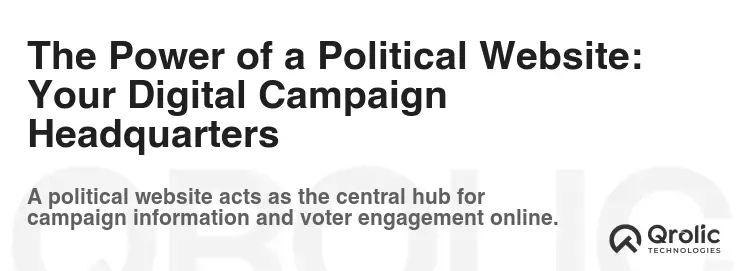
In today’s hyper-connected world, a compelling website is no longer optional for a political campaign; it’s the central nervous system. It’s the first place voters turn to learn about a candidate, understand their policies, and, crucially, decide whether to support them. Think of it as your 24/7 campaign office, tirelessly working to inform, persuade, and mobilize voters. But a static website isn’t enough. To truly resonate with potential supporters, your site needs to be dynamic, engaging, and packed with features designed to convert casual visitors into passionate advocates.
Why Your Political Campaign Needs a Stellar Website
- Centralized Information Hub: Your website is the single source of truth for your campaign. Voters can find accurate information about your platform, background, and stance on key issues, combating misinformation and controlling your narrative.
- Building Trust and Credibility: A professionally designed and informative website projects an image of competence and trustworthiness, essential for gaining voter confidence. Showcasing endorsements, media coverage, and detailed policy positions builds a strong foundation of credibility.
- Fundraising Powerhouse: Donation Portal A seamless donation portal allows you to collect contributions online, expanding your fundraising reach and making it easier for supporters to invest in your campaign. Integrated payment gateways and secure transactions are paramount.
- Volunteer Recruitment Center: Volunteer Signup An easy-to-use volunteer signup form allows you to recruit and manage volunteers efficiently. Clearly outline volunteer opportunities and make it simple for people to get involved.
- Community Building Platform: Your website can be a place for supporters to connect with each other, share ideas, and organize events. Features like forums, comment sections, and social media integration foster a sense of community.
- Data Collection and Analysis: Track website traffic, user behavior, and donation patterns to gain valuable insights into your audience and optimize your campaign strategy. Analytics tools provide data-driven insights to refine your messaging and target your outreach.
- Mobilization Tool: Use your website to announce rallies, town halls, and other campaign events, encouraging supporters to get involved and spread the word. Interactive maps and calendar integrations make it easy for people to find and attend events.
- Media Relations Hub: Provide media outlets with easy access to press releases, photos, and other campaign materials, ensuring accurate and positive media coverage. A dedicated press section streamlines communication with the media.
Core Website Features for Political Campaigns: The Essentials
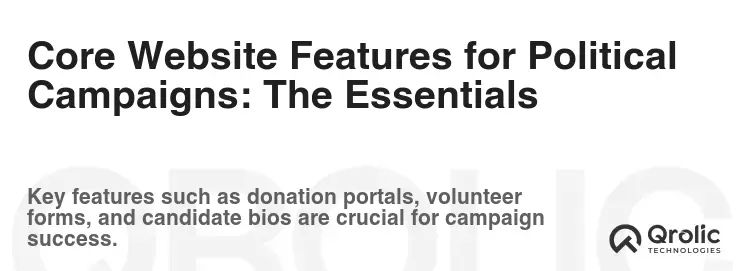
Every successful political campaign website should include these foundational features:
1. About the Candidate: Tell Your Story
This section is your opportunity to connect with voters on a personal level. Don’t just list your accomplishments; tell the story of why you’re running and what motivates you to serve.
- Compelling Biography: Write a narrative biography that highlights your background, values, and experience. Focus on the experiences that shaped you and your commitment to public service. Use storytelling to make it memorable and engaging.
- Personal Anecdotes: Share relatable stories that showcase your personality and connect with voters on an emotional level. Authenticity is key; let your true self shine through.
- Photos and Videos: Include high-quality photos and videos that show you interacting with people, speaking at events, and working in the community. Visual content is more engaging and helps voters connect with you on a deeper level.
- Endorsements and Testimonials: Showcase endorsements from prominent figures and testimonials from ordinary citizens who believe in your vision. Social proof is a powerful persuader.
2. Platform & Issues: Where You Stand
Clearly articulate your positions on the key issues facing your community. Voters need to know exactly where you stand and what you plan to do if elected.
- Clearly Defined Positions: Present your stances on key issues in a clear, concise, and easy-to-understand manner. Avoid jargon and technical terms.
- Detailed Policy Proposals: Provide in-depth explanations of your policy proposals, outlining the specific steps you’ll take to address the issues. Back up your proposals with data and evidence.
- Interactive Graphics and Charts: Use visuals to illustrate your policy positions and demonstrate the potential impact of your proposals. Infographics and charts can make complex information more accessible.
- FAQ Section: Anticipate common questions about your platform and provide clear and concise answers. This reduces confusion and builds trust.
- Issue-Specific Pages: Create individual pages for each key issue, allowing you to delve deeper into your platform and provide more comprehensive information.
3. News & Media: Staying Up-to-Date
Keep your supporters informed about your campaign’s progress, upcoming events, and important announcements.
- Blog Posts: Regularly publish blog posts on relevant topics, sharing your thoughts, insights, and updates. This helps keep your website fresh and engaging.
- Press Releases: Post all press releases on your website, making it easy for media outlets to stay informed about your campaign.
- Event Calendar: Maintain an up-to-date calendar of campaign events, including rallies, town halls, and fundraisers.
- Media Coverage: Highlight positive media coverage of your campaign, showcasing your accomplishments and building credibility.
- Social Media Feed: Embed your social media feeds on your website, allowing visitors to stay connected with your campaign on their preferred platforms.
4. Volunteer: Get Involved! Volunteer Signup
Make it easy for supporters to volunteer their time and energy to your campaign. A smooth volunteer signup process is essential.
- Dedicated Volunteer Page: Create a dedicated page outlining the various volunteer opportunities available.
- Easy-to-Use Signup Form: Use a simple and intuitive signup form to collect volunteer information, including contact details, skills, and availability.
- Specific Volunteer Roles: Clearly define the roles and responsibilities of each volunteer position.
- Volunteer Training and Resources: Provide volunteers with the training and resources they need to be effective.
- Volunteer Testimonials: Showcase testimonials from satisfied volunteers, encouraging others to get involved.
5. Donate: Fueling the Campaign Donation Portal
A seamless and secure donation portal is critical for raising the funds necessary to run a successful campaign.
- Prominent Donate Button: Place a prominent donate button on every page of your website, making it easy for visitors to contribute.
- Secure Payment Gateway: Use a secure payment gateway to ensure that donations are processed safely and securely.
- Multiple Donation Options: Offer a variety of donation options, including recurring donations, monthly pledges, and one-time contributions.
- Thank You Page: Redirect donors to a thank-you page after they contribute, expressing your gratitude for their support.
- Donation Transparency: Be transparent about how donations are used, building trust with your supporters.
6. Contact: Staying Connected
Provide multiple ways for voters to contact your campaign with questions, concerns, or suggestions.
- Contact Form: Include a contact form on your website, allowing visitors to send you messages directly.
- Email Address: Provide a dedicated email address for campaign inquiries.
- Phone Number: List your campaign’s phone number for those who prefer to communicate by phone.
- Social Media Links: Include links to all of your campaign’s social media profiles.
- Physical Address: If you have a physical campaign office, list the address on your website.
Ready to Build Your Next Project?
Let’s turn your ideas into a powerful digital solution. Contact us today to get started with expert web development and design services.
Advanced Website Features for Political Campaigns: Taking it to the Next Level
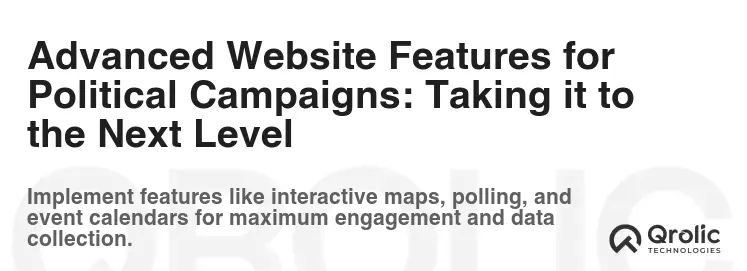
These advanced features can help you stand out from the crowd and create a truly engaging and interactive website experience.
1. Interactive Town Hall Meetings: Engaging Voters in Real-Time
Host live, interactive town hall meetings online, allowing voters to ask questions and engage with the candidate in real-time.
- Live Video Streaming: Use a live video streaming platform to broadcast the town hall meeting.
- Q&A Session: Allow voters to submit questions in advance or during the live broadcast.
- Moderated Discussion: Have a moderator facilitate the discussion and ensure that all questions are addressed fairly.
- Polls and Surveys: Conduct polls and surveys during the town hall meeting to gauge voter sentiment on key issues.
- Chat Functionality: Enable chat functionality, allowing voters to interact with each other and share their thoughts.
2. Personalized Content: Tailoring the Experience
Use data to personalize the website experience for each visitor, showing them content that is relevant to their interests and concerns.
- Location-Based Content: Show voters content that is specific to their city, state, or district.
- Issue-Based Content: Show voters content that is related to the issues they care most about.
- Demographic-Based Content: Show voters content that is tailored to their age, gender, or ethnicity.
- Behavioral-Based Content: Show voters content that is based on their past website activity.
- Personalized Emails: Send personalized emails to voters based on their interests and engagement with the campaign.
3. Multilingual Support: Reaching a Wider Audience
Translate your website into multiple languages to reach a wider audience and engage with diverse communities.
- Professional Translation: Hire professional translators to ensure that your website content is accurately translated.
- Language Selection Tool: Provide a language selection tool that allows visitors to choose their preferred language.
- Culturally Sensitive Content: Ensure that your website content is culturally sensitive and appropriate for all audiences.
- Localized Images and Videos: Use images and videos that reflect the diversity of your community.
- Multilingual Social Media: Create social media profiles in multiple languages to engage with diverse communities online.
4. Accessibility Features: Ensuring Inclusivity
Make your website accessible to people with disabilities, ensuring that everyone can access and engage with your campaign.
- Alt Text for Images: Provide alt text for all images, allowing screen readers to describe the images to visually impaired users.
- Keyboard Navigation: Ensure that your website can be navigated using only a keyboard.
- Clear and Consistent Design: Use a clear and consistent design that is easy to understand and navigate.
- Sufficient Color Contrast: Use sufficient color contrast between text and background to ensure that text is legible for people with low vision.
- Captioning for Videos: Provide captions for all videos, making them accessible to people who are deaf or hard of hearing.
5. Gamification: Encouraging Engagement
Incorporate gamification elements into your website to encourage engagement and reward supporters for their participation.
- Points and Badges: Award points and badges for completing certain actions, such as signing up for the email list, donating to the campaign, or volunteering.
- Leaderboards: Create leaderboards to recognize and reward the most active supporters.
- Challenges and Contests: Run challenges and contests to encourage engagement and drive participation.
- Interactive Quizzes: Create interactive quizzes to educate voters about your platform and encourage them to share their opinions.
- Social Sharing: Make it easy for supporters to share their achievements and contributions on social media.
6. AI-Powered Chatbots: Providing Instant Support
Implement AI-powered chatbots to provide instant support to website visitors, answering their questions and guiding them through the website.
- 24/7 Availability: Chatbots can provide support 24/7, ensuring that visitors always have access to assistance.
- Instant Answers: Chatbots can provide instant answers to common questions, reducing the need for visitors to search for information.
- Lead Generation: Chatbots can collect lead information from visitors, allowing you to follow up with them later.
- Personalized Recommendations: Chatbots can provide personalized recommendations based on visitors’ interests and needs.
- Seamless Integration: Chatbots can be seamlessly integrated into your website, providing a smooth and intuitive user experience.
Optimizing Your Political Website for Search Engines (SEO): Getting Found Online
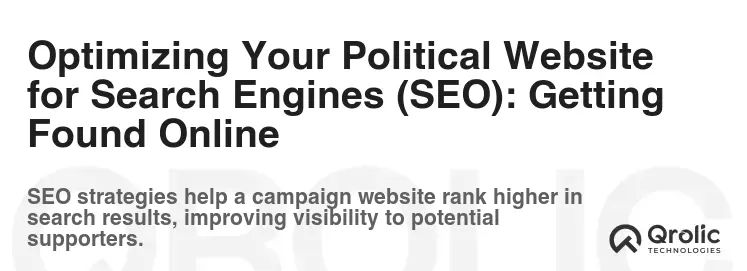
A beautiful and feature-rich website is useless if no one can find it. Search Engine Optimization (SEO) is the process of optimizing your website to rank higher in search engine results pages (SERPs), driving more organic traffic to your site.
Keyword Research: Understanding What Voters Are Searching For
- Identify Relevant Keywords: Use keyword research tools like Google Keyword Planner, Ahrefs, or SEMrush to identify the keywords that voters are using to search for information about political candidates and issues. Focus on long-tail keywords (longer, more specific phrases) to target niche audiences. For example, instead of just “political website,” try “best political website design for local elections”.
- Analyze Competitor Websites: Analyze the keywords that your competitors are targeting to identify opportunities for improvement.
- Consider Search Intent: Understand the intent behind each keyword and create content that meets the needs of the searcher. Are they looking for information, to donate, or to volunteer?
On-Page Optimization: Making Your Website Search Engine Friendly
- Optimize Title Tags and Meta Descriptions: Craft compelling title tags and meta descriptions for each page of your website, using relevant keywords to attract clicks. These are the snippets that appear in search engine results.
- Use Header Tags (H1, H2, H3): Use header tags to structure your content and make it easier for search engines to understand the hierarchy of your pages. Use relevant keywords in your header tags.
- Optimize Image Alt Text: Provide descriptive alt text for all images, using relevant keywords to help search engines understand the content of the images.
- Create High-Quality Content: Create high-quality, informative, and engaging content that is relevant to your target audience. Focus on providing value to the reader.
- Internal Linking: Link to other relevant pages on your website to improve navigation and help search engines understand the relationships between your pages.
- Mobile-Friendly Design: Ensure that your website is mobile-friendly, as Google prioritizes mobile-first indexing.
- Website Speed Optimization: Optimize the website speed for better user experience and SEO rankings
Off-Page Optimization: Building Authority and Credibility
- Link Building: Acquire high-quality backlinks from reputable websites to improve your website’s authority and credibility. Guest blogging, outreach to journalists, and participation in online communities are effective link-building strategies.
- Social Media Marketing: Promote your website on social media to drive traffic and engagement.
- Online Directory Listings: List your website in relevant online directories to improve its visibility.
- Reputation Management: Monitor your online reputation and address any negative reviews or comments promptly.
Local SEO: Targeting Local Voters
- Google My Business: Claim and optimize your Google My Business listing to improve your visibility in local search results.
- Local Citations: List your website in relevant local directories and business listings.
- Local Keywords: Target local keywords in your website content and meta descriptions.
- Encourage Reviews: Encourage your supporters to leave positive reviews on Google and other review platforms.
Ready to Build Your Next Project?
Let’s turn your ideas into a powerful digital solution. Contact us today to get started with expert web development and design services.
Measuring Success: Website Analytics and Reporting
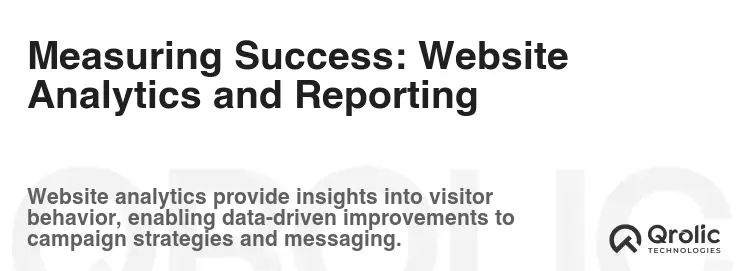
Tracking your website’s performance is crucial for understanding what’s working and what’s not. Use analytics tools to monitor key metrics and make data-driven decisions.
- Google Analytics: Use Google Analytics to track website traffic, user behavior, and conversions.
- Key Performance Indicators (KPIs): Identify the key performance indicators (KPIs) that are most relevant to your campaign, such as website traffic, donation rates, volunteer signups, and engagement metrics.
- Regular Reporting: Generate regular reports to track your progress and identify areas for improvement.
- A/B Testing: Use A/B testing to experiment with different website designs, content, and calls to action to optimize your website for conversions.
Qrolic Technologies: Your Partner in Building a Winning Political Website

At Qrolic Technologies (https://qrolic.com/), we understand the unique challenges and opportunities of political campaigns in the digital age. We specialize in building high-performing websites that are designed to engage voters, raise funds, and mobilize support.
Why Choose Qrolic Technologies?
- Experience: We have a proven track record of building successful political websites for candidates at all levels of government.
- Custom Solutions: We offer custom website solutions that are tailored to your specific needs and goals.
- Expert Team: Our team of experienced designers, developers, and digital marketing experts is dedicated to helping you win.
- Cutting-Edge Technology: We use the latest technologies and best practices to ensure that your website is secure, reliable, and optimized for performance.
- Affordable Pricing: We offer competitive pricing to fit your campaign budget.
Our Services
- Website Design and Development: We create custom website designs that are visually appealing, user-friendly, and optimized for conversions.
- Content Management Systems (CMS): We build websites on popular CMS platforms like wordpress, making it easy for you to manage your content.
- SEO Optimization: We optimize your website for search engines to drive more organic traffic to your site.
- Social Media Integration: We integrate your website with social media platforms to expand your reach and engagement.
- Donation Portal Development: We create secure and seamless donation portals to facilitate online fundraising.
- Volunteer Signup Systems: We develop easy-to-use volunteer signup systems to recruit and manage volunteers efficiently.
- Ongoing Support and Maintenance: We provide ongoing support and maintenance to ensure that your website is always running smoothly.
Let Qrolic Technologies help you build a winning political website that will help you connect with voters, raise funds, and achieve your campaign goals. Contact us today to learn more about our services.
Conclusion: Your Website – The Foundation of Your Campaign’s Digital Success
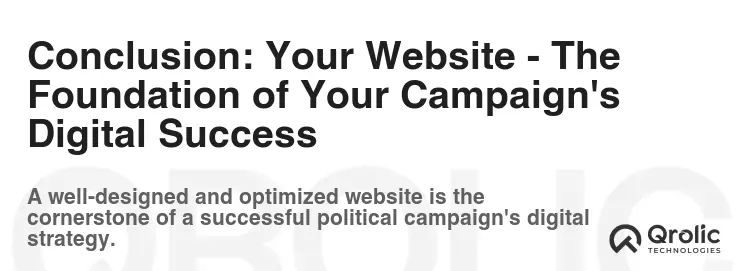
Your political website is more than just an online brochure; it’s the foundation of your campaign’s digital presence. By incorporating these best website features, optimizing for search engines, and continuously analyzing your results, you can create a powerful platform that engages voters, raises funds, and ultimately helps you win the election. Remember to prioritize user experience, provide valuable content, and make it easy for people to get involved. With a well-designed and strategically optimized website, you can amplify your message, connect with voters on a deeper level, and achieve your political aspirations.






